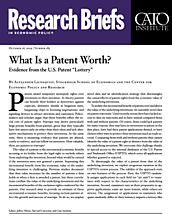The value of a patent is the incremental economic benefit accruing to its holder from the legal right to exclude others from exploiting the invention, beyond what would be earned if the invention were not granted a patent. Separating this incremental benefit from the economic value of the underlying invention is challenging. Previous studies document that firm value increases by the number of patents a firm holds or when a firm is awarded a patent, but these correlations conflate the value of the underlying inventions and the incremental benefits of the exclusion rights conferred by the patents. Our research aims to provide an estimate of these incremental economic benefits, focusing on how patents affect the growth and success of startups. To do so, we employ novel data and an identification strategy that disentangles the causal effects of patent rights from the economic value of the underlying inventions.
To isolate the incremental benefit of patents over and above the value of the underlying inventions, we assemble novel data on patent rejections. Until recently, researchers have lacked access to data on rejections and so have instead compared firms with and without patents. Of course, firms could lack patents for many reasons: they may have no inventions to patent in the first place, have had their patent applications denied, or have chosen other ways to protect their inventions (such as trade secrets). Comparing firms with and without patents thus cannot identify the value of a patent right as distinct from the value of the underlying invention. We overcome this challenge thanks to special access to the internal databases of the U.S. Patent and Trademark Office (USPTO), which cover all applications whether granted or rejected.
To disentangle the value of a patent from that of the underlying invention, we exploit exogenous variation in the USPTO’s review process. The validity of the approach rests on two features of the process. First, the USPTO randomly assigns applications in each field (or “art unit”) to examiners with respect to the characteristics of the underlying invention. Second, examiners vary in their propensity to approve applications: some are more lenient, while others are stricter. The assignment of applications to examiners who quasi-randomly differ in their leniency imparts a lottery-like element to the process: among applicants with patentable inventions, some win patent rights, while others do not simply because the former were lucky enough to draw more-lenient examiners. This allows us to isolate the economic benefits of patent rights from those of underlying inventions.
Our sample covers all 34,215 first-time patent applications filed by U.S. startups at the USPTO since 2001 that received a final decision by December 31, 2013. Our estimates suggest that winning the patent lottery, by randomly drawing an examiner more likely to approve applications, increases the average startup’s growth in employment and sales over the next five years by 54.5 and 79.5 percentage points, respectively, compared to startups with only randomly different underlying inventions that fail to obtain a patent. For the average sample firm, these estimates imply that receiving a patent leads to a cumulative 16 additional employees and $10.6 million in additional sales over the five years after winning the patent lottery. It also increases both the number of subsequent patents the firm is granted by 56.5 percent and their quality (with the average number of citations per subsequent patent increasing by 33 percent).
In contrast to the large benefits of receiving a first patent, subsequent patents are much less obviously beneficial. We find little evidence that approval of a second patent application boosts growth in employment or sales significantly (even for startups whose first application was rejected), though it does increase the number of subsequent patents by 49.8 percent. Approval of a third patent shows similar patterns. These results suggest that the value of patents to startups changes over time. Securing a first patent, when startups typically have few other assets, allows them to innovate and embark on a high-growth trajectory. Subsequent patents encourage further innovation but play less of a direct role in boosting growth, which instead presumably depends on other resources the startups have acquired along the way.
What explains the large economic benefits startups derive from obtaining a first patent, over and above the economic benefits arising from the underlying invention? To answer this question, we investigate a funding channel. Empirically, we find that the first patent increases a startup’s chances of securing funding from venture capitalists (VCs) over the next three years by 47 percent, of securing a loan by pledging the patent as collateral by 76 percent, and of raising funding from public investors through an initial public offering by 128 percent. The VC funding effect is strongest for startups founded by inexperienced entrepreneurs and located in areas where attracting investors’ attention is harder but is weakest for biochemistry startups. Mirroring the ambiguous effects of subsequent patents on the performance of startups, we find that the approval of a startup’s second application appears to have no statistically significant impact on the startup’s ability to raise VC funding.
Collectively, our findings suggest that patents facilitate startups’ access to external finance in contexts where information frictions, and thus contractual hazards, are especially high. A patent grant sets a startup on a growth path with funding that helps transform its ideas into products and services that generate jobs, revenue, and follow-on inventions.
NOTE: This research brief is based on Joan Farre-Mensa, Deepak Hegde, and Alexander Ljungqvist, “What Is a Patent Worth? Evidence from the U.S. Patent ‘Lottery,’” Journal of Finance, forthcoming, https://papers.ssrn.com/sol3/papers.cfm?abstract_id=2704028.

